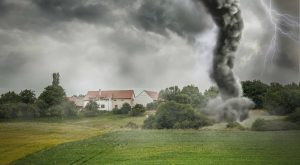Denied, Delayed or Underpaid Insurance Claim? Claim Excellence
Tornado Claims
 Compared to other types of natural disasters, tornadoes have the greatest potential to cause the quickest and most violent damage. Though most tornadoes form and dissolve without causing much loss, a small percentage of tornadoes are forceful in nature and can cause massive property damage.
Compared to other types of natural disasters, tornadoes have the greatest potential to cause the quickest and most violent damage. Though most tornadoes form and dissolve without causing much loss, a small percentage of tornadoes are forceful in nature and can cause massive property damage.
Tornado damage is generally associated with high-speed winds. As such, residents in the path of a tornado are at risk of sustaining structural damage to their homes. This leaves a homeowner’s possessions vulnerable to the elements, potentially resulting in more loss from fire and water damage. The situation become all the more distressing when insurance companies make things increasingly difficult for diligent policyholders whose properties have been seriously compromised or destroyed.
If you need assistance with a troublesome tornado insurance claim, call The Cook Law Firm at (361) 541-4551. Our attorneys have the experience, knowledge, and resources to help both residential and commercial property owners that have been unfairly treated by their insurance companies.
Common Tornado Losses
The intensity of a tornado has nothing to do with how small or large a tornado is. Larger tornadoes can be weak in terms of intensity, while smaller tornadoes can be much more powerful and wreak total havoc.
Areas struck by a mighty tornado can leave behind a trail of destruction—overturned cars, demolished buildings, wafting smoke, and piles and piles of debris. Some common forms of tornado damage to a home include:
- Cracked interior walls
- Shattered or broken windows, shutters, screens, and panes
- Broken or missing shingles
- Roofs displaced or blown off
- Cracked or separated foundation
- Cosmetic damage to the home’s exterior
- Electrical and plumbing issues
Preventing Tornado Damage
Homeowners should know that taking precautionary steps can be much easier and cheaper compared to having to recover from significant loss stemming from a tornado. While there is nothing you can do to entirely shield your home from a tornado, there are a number of steps you can take to help protect your home for a tornado and its aftermath:
- Remove or store items outside that could be potential hazards
- Examine and reinforce your entry door
- Protect your windows and doors
- Secure furniture and large appliances
- Repair or reinforce your roof
- Prune tree branches near the roof
- Cut down trees or branches that could potentially be a risk to the home
Insurance Company Bad Faith
The good news is that unlike natural disasters such as floods and earthquakes, tornadoes are covered under the average basic homeowners or commercial property policy. The bad news is that this doesn’t stop insurance companies from underpaying, delaying, or denying tornado claims.
Some acts of insurance company bad faith are:
- Denial of your property damage claim
- Excessive reporting requirements
- Accusations that your property did not meet specific code requirements
- Low-ball assessments and settlement offers
- Failure to pay claims promptly
- Failure to investigate and assess tornado damage properly and promptly
Call The Cook Law Firm Today
Homeowners affected by a tornado typically approach the situation expecting that the insurance company is there to help them obtain maximum compensation—but this assumption couldn’t be further from the truth. Policyholders should be aware that the insurance adjuster’s priority is to protect the company, even if it means cutting corners or denying claims at the expense of unsuspecting tornado victims.
At The Cook Law Firm, we have the expertise to help you deal with your tornado insurance claim. If you feel that your insurance company is treating you unfairly in the wake of a tornado, call The Cook Law Firm, PLLC at (361) 541-4551 to work with legal counsel who’ll help determine the best course of action. We will stop at nothing to ensure that you are given the full compensation you need and deserve.
Request a FREE Case Evaluation Below
